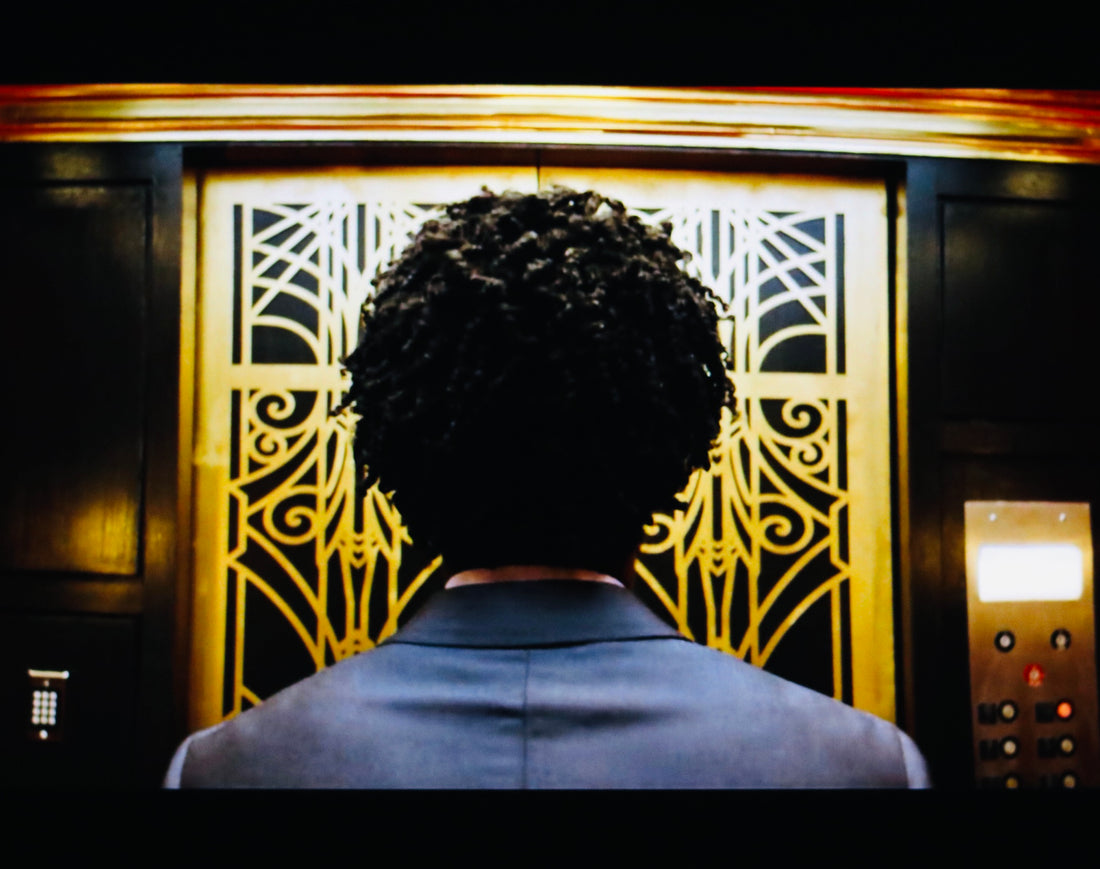Sorry To Bother You - Analyzed

.

The biggest thing that this film touches on is code switching.
Which has long been a strategy for black people to successfully navigate interracial interactions and has large implications for their well-being, economic advancement, and even physical survival.
One of the most interesting things I noticed was how the film used this commercial tone of satire to show the reality of how white washed the commercial tones tend to be.
For example Danny Glover (Langston) says "if you want to make money here, you need to use your white voice", and the way they implement this is actually using a white persons VO's; which makes it even more jarring/experimental as a film.
.
I think that all the ways they showed us TV clips was the reality of how tv commercials either blatantly lie to us. Sometimes in blatant outrageous persuasion tactics - a prime example of this is the opening commercial scene about the 'Worry free factories', and how Worry free was the saving grace for every struggling citizens. Which to me was a direct highlight to what mass incarceration looks like in the United States. There was a sign Cassius was passing that said
“If you lived here you'd already be at work”
That in itself with no dialogue is such a strong statement to the school to prison pipeline and mass incarceration of black and brown bodies in America.
It was amazing how they used the world of advertising to showcase the injustice and human rights violation of prison labour, like you don't see much talk about that in real life commercials, it was important to see them do that in the narrative.
.



Not my Images.
.
Part 2
A lot of what happened in terms of the film style is so different to many mainstream film conventions which is why I can say this film falls into the experimental genre. For example the scenes when Cassius is at work and he physically gets warped into the space of his caller while he's speaking in is white voice, is very jarring but fitting to out-worldly experience.
I also think so many random moments seemed like satyrical critical assessments of hype social culture and the exclusivity it encompasses - What I mean by this is in today we see the VIP section as exclusive spaces that are held on a very high pedestal - When Cassius went out to party and sat around the VIP area he had no personal space, to the extent his drink was spilled on him and he ended up having zero fun. That says a lot about actual VIP spots in club settings and how a lot of LA celebrity life can be all hype but not fun.
.
Something I found very interesting in this movie and in other films is this style of dropping insights into the mechanism of Hollywood, how things in the film world are truly all just a form of capitalistic, transactional sales tactics to grab an audiences attention and convert that to profit. This sort of vail opening transparency we haven't seen or heard much of before in films till now.
.
Another perfect example of this would be be in the film Malcolm & Marie (2020 Levinsone) when they both laid on the floor after Malcolm read aloud his review from the New Yorker, Marie goes on this rant about how fake the institution of films are. She calls out the use of certain themes in the article, primarily around the failing healthcare system, and unpacks the industry at a whole; it's a very deep exploratory scene.
An example of this in the film was when we had to watch the interview of the CEO speak after the allegations that were brought to the surface. He gives this very scripted PR response all while trying to bring sales to his book.
They showcased it in the realm of the art world too, when Detroit calls out the fake and bougie environment the art world fosters, but then conveniently uses her white voice as well because she's an artist that sells to majority white buyers,
My last example would be how they showcased tokenism. How becoming the token black person in a white dominated space can often consume the black identity and then in turn exploit it.

Part 3
.

The Formal Elements
The film emphasizes rich and bold colours, it gave it this energetic, vibrant feel, that further played on this mystical vibe; a cool technique was used called the vertigo shot often referred to as the dolly zoom.
The Dolly Zoom is an in-camera effect that appears to undermine normal visual perception. The effect is achieved by zooming a focal lens, to adjust the angle of view while the camera dollies toward or away from the subject in a way that keeps the subject in the same position of the frame throughout.
.

.
This technique was used a few times as a close up shot, where it and the aerie diegetic/ extra-diegetic sound meshed so well, making the film even more dramatic in nature.
There are moments that made the film feel like a magic trick all while touching on very serious topics.
We all enter the dream like space with major confusion (the characters within and the audience watching) and then it snaps out of this space with the use of the expected diegetic sound (busy bar + music being played at the bar).
Other moments would be when Detroit would show off her earrings, which were always very heavy political, body positive statements.





.
A good way to explain the way a-lot of clips appeared to be random and logically out of place, is to look at how comic books function, and the science behind how frame transitions work. In the comic book text book 'Understanding Comics' - it highlights that there are 6 ways you can create transitions (from one frame to the next) and the 6th is defined as the 'Non Sequitur'
Which offers no logical relationships between panels - a good example would be when Cassius was being offered the power ball position and it goes from a medium close up shot of him to a wide shote of everyone, then back to him, then randomly a shot with his high-school football players in the room cheering, then back to him.
.
This notion of extreme barriers to entry, being so unreasonably accessibly is interesting to see, for instance when his old boss puts in the elevator password and it's this long ass sequence of a million numbers.
Another theme of private companies being the gatekeepers to a lot of political actions and decisions is such a crazy but very real concept. We then see what that means about the very negative impacts of capitalism that manifests.
.
I thought it was cool when Cassius and his friend got into it but did it this strange ani-climatical exchange of powerful affirmations and compliments. the same way him and Detroit got into it.
All in all I think this film was very well paced. All the way till the end, it kept you shooketh and surprised, which from an engagement stand point is important for longer films.


